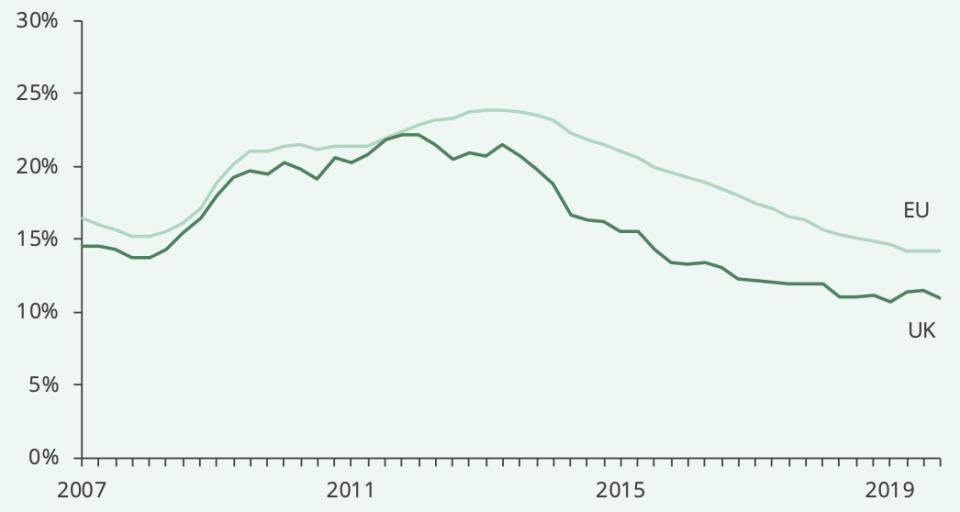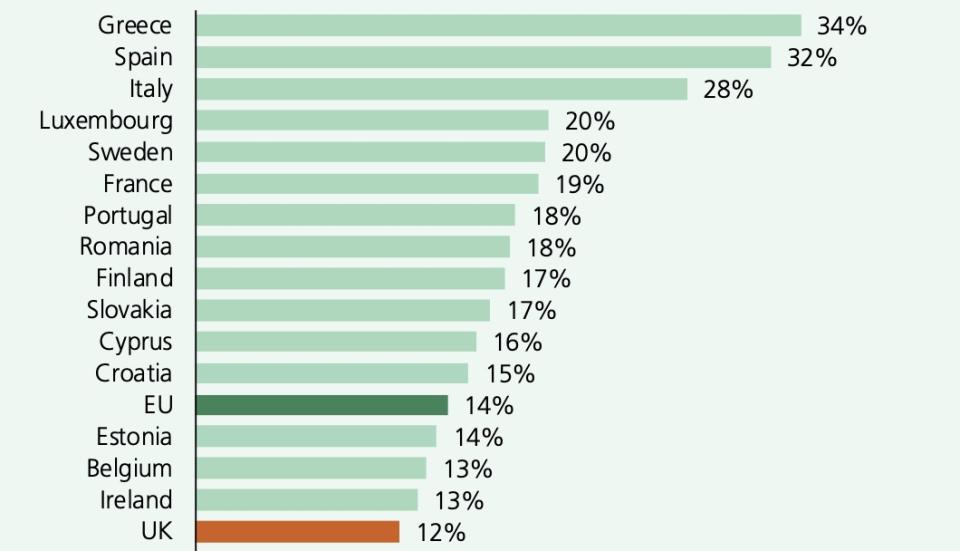Coronavirus: How economic crisis could scar a generation of young people

Erin McDonough felt like she had “struck gold” when she landed an apprenticeship at a textiles manufacturer three years ago.
The 20-year-old from Liverpool not only thrived in the role buying fabric supplies, forecasting sales and running social media accounts, but also benefited from a part-time degree funded by her employer.
Now she is dealing with redundancy for the second time in four months, and fears being thrown off her course without an employer to sponsor her. “People aren’t hiring. Three years’ study down the drain would be devastating,” she said.
Young people like McDonough are among those bearing the brunt of the economic crisis triggered by the coronavirus. Youth unemployment could soar above one million this year, according to analysis by the Resolution Foundation published on 6 May.
Experts warn the impact could be long-lasting, with calls for a youth jobs guarantee to stop the recession ‘scarring’ career and pay prospects for years to come.
Young people taking the hit
Hundreds of thousands of young people leaving education this year face “huge immediate unemployment risks,” according to Kathleen Henehan, a Resolution Foundation analyst.
Past downturns show such young people are the most disadvantaged in job-hunting during a recession, with their limited experience thwarting their chances as vacancy levels plummet.
Youth unemployment stood at 31% among recent school leavers with GCSE qualifications in the aftermath of the last crisis in 2011, more than three times higher than the national unemployment rate. Young people with jobs are also more vulnerable to cutbacks, as they are often among the most recently hired, least experienced and most likely to be on insecure contracts.
All the signs are that this crisis will be no different. Youth unemployment among those aged 18-24 already stood at 408,000 in February, and the Resolution Foundation expects the pandemic to lift the figure by another 600,000 this year.

READ MORE: What to do if you lose your graduate placement this summer
Official data will only come in the summer, but surveys make grim reading. Some 10% of workers under 30 had already reported losing their job in a poll at the end of March, compared to 6% of 40-55-year-olds. Over two-thirds (69%) said they had worked or earned less.
Training opportunities are drying up too. Almost a third of graduate employers in one survey had slashed internships, and two-thirds cancelled work experience. Another poll of students found 63% of those applying for jobs had seen applications paused or offers withdrawn.
The current crisis could prove even worse than in the past. Henehan notes it particularly affects jobs that often form the “first rung of the employment ladder.”
Research by the Institute for Fiscal Studies shows under-25s are more than twice as likely to work in sectors that have been shut down. Many hard-hit hospitality, leisure, travel and retail firms are struggling to keep current staff, let alone hire new recruits.
How a jobs guarantee and education could help
Pressure is growing for the government to step in. The Trades Union Congress (TUC) and Resolution Foundation both called for a “jobs guarantee” for young people this week.
Such a plan would see employers offer the unemployed temporary jobs with wages funded by government, alongside intensive careers support. A similar scheme after the global financial crisis saw 105,000 jobs created, with a report finding a “net benefit to participants, their employers and society as a whole.”
The Resolution Foundation also argues for keeping young people in education through “flexible arrangements.” Providers could run special summer short courses, universities could re-open admissions to late applicants and maintenance grants could be extended to further education students.
But sustaining education provision during the pandemic is proving challenging already, let alone expanding or reshaping it at breakneck speed. The Treasury is also wary about rising costs from existing job support schemes.
McDonough’s experience so far shows a system that seems anything but flexible. First she was made redundant as she started her last job just weeks too late for the government’s cut-off date to be furloughed. She could have continued to earn and do her degree but calls to extend the cut-off date, including by her old boss, have fallen on deaf ears.
Now she fears being forced to leave university early without her degree. Government rules leave redundant apprentices three months to find a new job, or else lose their training place.
Officially this rule is currently “under review,” while the government’s “ambition” is to help apprentices find new jobs. McDonough has written repeatedly to the government, hoping to get more time finding work or funding without an employer. But with the clock ticking, she has received no more details on possible extensions, and no offer of help to find work.
READ MORE: Brits overtake migrants looking for fruit-picking jobs
Her university may let her go full-time, defer a year or help with job-hunting. But she balks at paying full fees herself or delaying studies, and believes no new employer will sponsor her mid-crisis, even if she can get a new job. Yahoo Finance UK has approached the department for education for comment.
“I’m stuck between a rock and a hard place,” said McDonough. Her main fear is for her career prospects if she cannot both find work and complete her degree. “It’s really distressing. I’d struggle to achieve anything I planned to achieve,” she said.
Young people are right to be worried about the long-term. Long spells without work not only hit their livelihoods, finances and wellbeing in the present but supporters of a jobs guarantee highlight studies that show a ‘scarring’ effect well into the future.
Unemployment raises the chances of young people being stuck in lower-paid, lower-skilled work or without a job at all years down the line. The Resolution Foundation forecasts low-skilled teenagers leaving education during the crisis will be 37% less likely to be in work in three years’ time. Graduates’ chances are predicted to fall by 13%.
UK government ‘doing everything we can’

The picture is not entirely bleak, however. Recruitment has not dried up altogether, particularly in sectors like logistics, food, farming, accounting, IT, healthcare and much of the public sector. The Office for Students has urged students to seek help from school and university careers advisers about opportunities.
At least a third of large firms that usually hire graduates report pressing on with recruitment plans, and a third are undecided. One of McDonough’s friends still has her place on the TeachFirst programme. The charity has shifted its entire summer training online, and is still trying to get trainees into schools in September.
Meanwhile the government’s £330bn ($409bn) business support scheme and furlough initiative have saved millions of jobs for now at least. An easing of the lockdown may lift recruitment, despite growing fears recovery will be weak.
READ MORE: UK government now paying wages of 6.3 million furloughed workers
“We are doing everything we can to protect our economy and make sure there are options for young people leaving education,” said a government spokesperson. “We’ve launched a targeted employment campaign and a new online Skills Toolkit, helping to keep people learning and building their skills.”
It is no consolation to the unemployed, but the youth unemployment rate going into the crisis was also lower than elsewhere in Europe. Eurostat figures put it at 12% in the fourth quarter of 2019, compared to an EU average of 14% and rates above 20% in Greece, Spain, Italy and Sweden.
As for McDonough, she hopes relaxed Treasury furlough rules or recovery will eventually allow her former employer to re-hire her instead. For the moment she is ploughing on with her coursework and classes, now taught online. “There’s no clear path ahead, but I’ve been able to pretend everything is normal.”

 Yahoo Finance
Yahoo Finance 